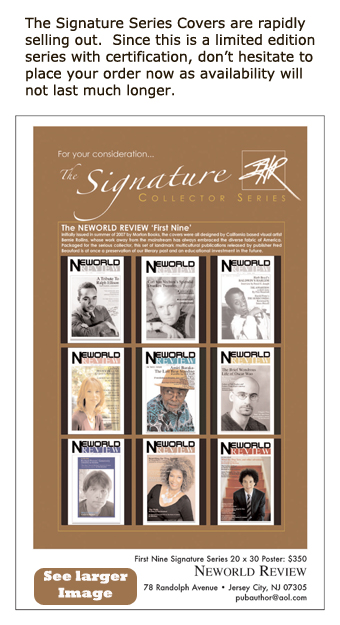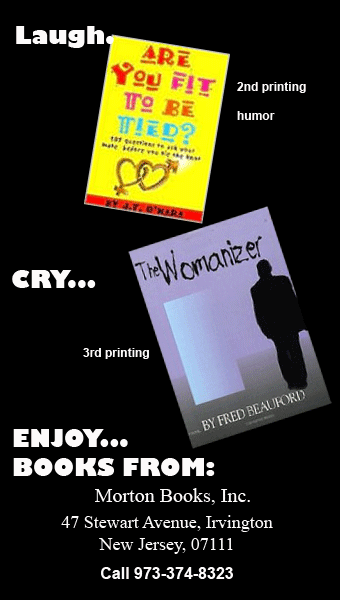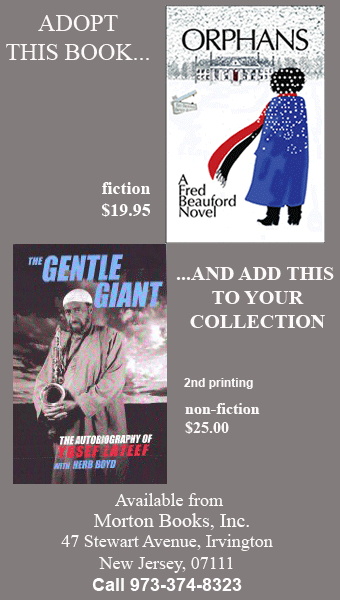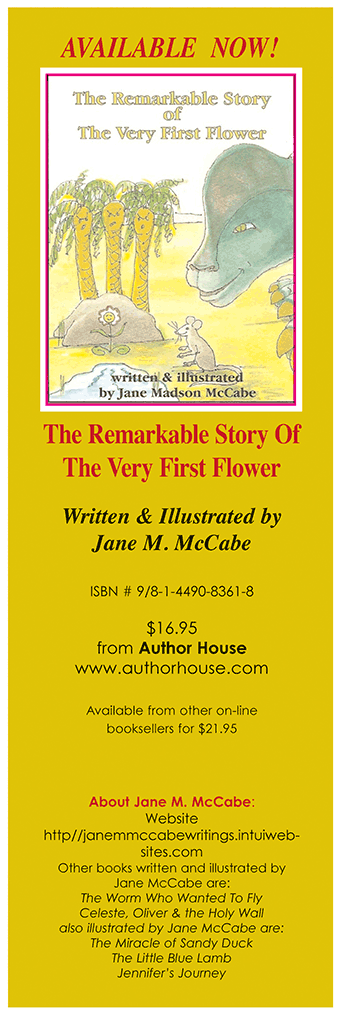MEMOIR
…and Mistakes made Along The Way
An excerpt from a memoir by Fred Beauford
Chapter Ten—Social Action
The answers to my many problems would soon come my way. First, I was able to solve the problem of fees. At the outrageous cost of $75.00 per credit, NYU was among the most expensive schools in the country (we won't even talk about what it currently costs per credit, many year’s later). I discovered that by working for the university, they would cover the cost for up to eight credits, just the amount that I was taking.
The day I walked into NYU’s personnel office, I couldn’t have been happier, because lo and behold, who should be sitting behind the desk interviewing me but a fellow by the name of John O'Neal. I had served with him in the Army.
John was a very unimposing, nondescript looking man, but he was memorable from my Army days because one afternoon, in the middle of the Atlantic Ocean, on a special entertainment program, he entertained the troops on our way to Germany on the SS Randall by playing the piano and singing "The Girl That I Marry."
As I have pointed out, Elvis was on the same program, and served as M.C. Elvis, graciously introduced John, calling his a great talent, in perhaps the highlight of his life.
Obviously, we troops were solely disappointed that we couldn’t get the King himself and had to settle instead for a more subdued John O'Neal, who crooned in an old fashioned manner a not so bad version of "The Girl That I Marry." We were polite to John, however, and he carried his song off with aplomb.
Now there I was at NYU, sitting across from him, surprised and happy as all hell that he was sitting where he was. John quickly found me a job at a lab at the dental college cleaning up after the Graduate students, and that ended one of my monetary problems.
The second problem was my increasing restless energy. So much was going on. It was 1965. President Johnson had continued to escalate the war in Vietnam even after he was elected on a peace platform, and the protests in the streets were growing larger and angrier. The black movement in the south was also growing louder.
I was working during the day and sitting in class in the evening, totally uninvolved in this havoc that was swirling around me.
At first, I paid little attention to the war protest. I had just finished my Reserve time and the military could no longer touch me. Luckily for me I had the foresight to join at eighteen, because right about then the Draft Board would have come calling, and instead of me spending my evenings at NYU discussing Camus with a polite group of rich, intelligent, attractive, middle aged Jewish women, I surely would have ended up walking fearfully through steaming jungles and dank patty fields of rice in Southeast Asia, with danger all around, my worst nightmare since the age of 13 becoming all too real.
That worry was now history, so I could listen and debate “The Domino Theory” with the same kind of easy detachment I debated Existentialism.
The Civil Rights Movement was something else again. I couldn’t ignore that. I had followed the movement closely. I watched and read everything I could about it. Nightly, I would sit, transfixed, by my little black and white television, fascinated by all of the many highlights: the bombings, the marches, the boycotts, the burning buses, the beatings and shootings, the awe inspiring speeches, and for the first time in my life, incredible, extraordinary people like James Baldwin, Malcolm X, Bayard Ruskin and Martin Luther King, Jr. unexpectedly began crowding my TV screen.
This was grand drama, better than anything I was reading in all the books I loved so much. I could see that right away. And it wasn’t about who was right or who was wrong. It wasn’t a question that these long-suffering black people, Americans who built the country and created its soundtrack, were noble, brave people fighting for long denied rights.
And, as all of this was unfolding day after day, year after year, somehow l felt left out, and that somehow I was not doing anything to help the movement and help my people.
***
In my small circle of friends before college, no one much talked about what was happening in the south. But the turning point for all of us was what happened in Birmingham, Alabama, and made us all pay more attention. In 1963, fire hoses and police dogs were set upon black demonstrators, as the Civil Rights Movement, led by Dr. Martin Luther King, Jr., once again filled my television screen.
A few days before that disgraceful event, when Birmingham's Police Commissioner Bull Connors turned loose his full city resources of policemen and firemen on those demonstrators (perhaps just as Martin Luther King had hoped he would in a classic "rope a dope" strategy)--I was talking to a middle aged white woman who had come over from England as a young child, and who now worked as a clerk on the same floor that I worked on at Robert Hall. She was telling me how much she had enjoyed her recent trip through Alabama.
"The people are so friendly and happy," she informed me.
"I don't think the black folks down there are happy at all," I answered.
"Oh, no. Oh, no. You are wrong there. They were very happy when I was there."
A few weeks later, the shit hit the fan. The next morning, after viewing the debacle in Birmingham on the Nightly News, I ran over to this woman’s desk the minute I hit the floor, not even bothering to hang my coat in the dressing room.
"You still think they are happy? You still think they are happy!" I practically yelled at her. She just looked back at me strangely, and said nothing.
***
I had listened over the years with growing admiration to Malcolm X, and once seriously thought about becoming a Black Muslim. I once again discovered, after my tentative decision to go ahead with my idea to join the Nation of Islam, that my inner personality has a propensity to become too over-heated, too extreme, and too ready to go to the mat (General Patton and I share three major things in common, I have learned, which I won’t divulge, except for “Ok, put up your dukes, smart guy”).
I couldn’t walk around all day thinking about white people in such a hateful manner, no matter how much I felt they richly deserved it. So that idea was quickly banished from my head after only a few weeks, after I found myself glaring angrily, for no reason other than the fact that she was white, at a young woman on the No. 5 train to the Bronx, with nothing but red hot hatred and fury in my eyes and in my heart.
She had done nothing to me. I knew that. After that, I just didn’t like the way hate made me feel. It just didn’t wear well, no matter how hard I tried to make it fit.
***
1965 was the year that Malcolm X was murdered, while I was sitting in classrooms at NYU. But the epic civil rights battles in the nation continued. I wanted more than anything else to be involved in the struggle. I felt that I could use the great intelligence that I now was so sure of, and now held closely, to help black people, or Negros, as we were known then.
In a few years, I found an outlet.
***
I can still remember, as if it was yesterday, the day the world changed for me forever. I was sitting in the audience watching a group of black panelists discuss the Civil Rights Movement and where it was headed. It was 1967 and a panel discussion was being held at the Washington Square Campus of New York University. Here, on this stage, I watched for the first time in my life, highly educated, articulate, intelligent, committed black people.
One person in particular stood out from the others. She was a young woman, a few years older than me, and, as the others spoke, for some reason, I watched her carefully. She just sat and listened with an almost languid look on her attractive face, almost as if she was tired, or her mind was elsewhere. Her name was Eleanor Holmes Norton. She later became the Congressional Representative from the District of Columbia, among other important positions she held during her great career.
She did an incredible thing for me that afternoon.
As her turn to speak came, and she began her articulate speech, her entire being became alive in a way I had never witnessed before.
She had hope. She saw brotherhood. She saw an America where all races could love each other, and share what we had. I don’t remember what exact words she used that afternoon, but whatever they were, the young, passionate Ms. Norton filled in me a new sense of direction and purpose. I now wanted to know people like her. I wanted desperately to be a part of whatever it was that so animated her with such conviction.
***
The same day that I was so turned on by the young, passionate Eleanor Holmes Norton, someone had passed out a flyer for a meeting that was going to be held on campus for a new black organization.
There was one other black person in my evening Associate Arts program. She looked a lot like my mother: fair-skinned, elegant and middle aged, but that is where the two parted company. My uneducated mother may have long harbored upper class dreams as the offspring of the most upper class black family in Northern Virginia, as well as being the nanny for several of the richest people in America, but they were kept in check by a grim reality, only occasionally flaring up in moments of downright disgust at the lower order.
She had to work hard in an overbearing, unforgiving New York City, just to keep herself and her four children afloat, without a man to help her (thank god she loved leaving the house five days a week, sometimes with snow piled so high I often wondered if she was going to come back. Sitting around waiting for something good to happen was not her style. I think this is how I picked up my love for work and a sense of purpose).
This woman, my classmate at NYU was a married, upper-class woman, just like her Jewish counterparts.
So where were the blacks?
A flyer offered promise. The first meeting was upstairs at the Loeb Student Center and the person who called it to order was a bright young law student by the name of Jimmy Carroll. My brother Rob had by now enrolled in the same program, only going for an AA in business, not the Liberal Arts section I was enrolled in. He had just finished serving four years in the Marines. (I was the wimp that joined the sissy-ass Army). I used my connection with the crooner, John O’Neal, to land him a job at the university.
I took Rob to that first meeting. I was very excited by the opportunity to meet other black people near my age, and I offered all kinds of ideas and suggestions. We named ourselves The Black American Student Association (BASA) of New York University.
We were black now, not Negroes. Stokely Carmichael, Chairman of The Student Non-violent Coordinating Committee (SNCC), had seen to that when he yelled "black power!" to the cameras at the continuation of the James Meredith march against fear. Mr. Meredith was shot afterwards in the back by a cowardly white man hiding in the bushes alongside a country road in Mississippi.
This BASA was soon going to put a stop to that kind of nonsense! In fact, we were going to do all kinds of wonderful things, including saving black people from the evil grip of white people. Still, I couldn’t help noticing as we left the meeting, that all of us were able to fit into one elevator. Was this the entire black student body at NYU? If so, the first thing we needed to do was to save ourselves! It was clear that we had to find a way to bring more black students on campus.
***
On the subway back to the Bronx, I talked Rob’s head off, still excited.
I quickly threw myself into this new organization. To put myself back on the couch, I have long seen a clear pattern to my behavior. I am clearly a joiner, despite all the bad names some people call me for being so inner driven. It is clear to me that I am not a loner, but someone who loves having many friends. My first job, at the age of ten, was delivering newspapers when I was living at The Home in Buffalo. It gave me a chance to meet people without the watchful eyes of Mrs. Thompson. The Home also had countless, sometimes deeply disturbed children coming and going. The Bad Boys of the Edenwald Enchanters provided an incredible male bonding that could only be experienced in an environment like I experienced as a teenager in the Third Armored Division. The Associate in Arts Program at NYU and then BASA--were all highly organized activities, with a complicated array of rules, taboos, rituals and pecking orders—and very defined individuals.
With BASA, I was just joining another gang, albeit a much smaller one than the ones I had been accustomed to.
***
Jimmy Carroll, the student who was the founding voice behind BASA, was a very serious young man, indeed. Then, he was thin, handsome, with light-brown skin and “good hair.” He was from Queens, had successfully graduated both from high school and college, and was now a student at a prestigious law school, with only two other blacks.
Growing up, Queens, to those of us living in the Bronx, was a middle-class suburb, and the blacks who lived there were considered hopeless snobs.
Jimmy was a first year law student at NYU. He was no snob. In fact, he was very committed to the movement to help black people, much more than I was in 1967. He reminds me now of a much more fun Hillary Clinton, always on point.
Together, we began exploring the new, exciting world of black power. It made perfect sense for Jimmy, more so than me. College students—because of the Civil Rights Movement, the Vietnam War, and the ever lurking draft—were now center stage. Because of their sheer numbers, the Baby Boomers, of which I was merely on the cusp, now had a loud, growing, powerful voice; perhaps the first, and last time, young people in this age group would be able to have that much influence on the world scene.
The first thing Jimmy and I did was to start a newspaper, The Faith, which was my first time in charge of an editorial product. We also started forming alliances with black students at City College, St. Johns and Columbia. In many ways, for me, this was the Enchanters all over again!
One bit of real excitement came when we visited Newark, New Jersey. That was the summer of 1967, right in the middle of the period known as the “long hot summers,” when race riots were now commonplace. A race riot had recently occurred in Newark, killing 23 people and injuring 725 others. Black nationalists, like Newark native Amiri Baraka, called a Newark Black Power Conference, and leading figures in the new movement had been invited.
This would be our first opportunity to hang out with the big boys, so to speak.
The large auditorium that served as the main venue for the conference was packed with nationalists, and the atmosphere was fully charged. Cries of revolution were in the air. Jimmy excused himself after a while to go to the restroom.
A wild-eyed looking black man, wearing the white collar of a preacher, suddenly stood up and yelled, “And we have to get guns. We need to find all the guns we can find. Then we will show them they can’t mess with us any longer!”
He was greeted with loud applause.
I was eager to get into the act, and have my voice heard. After all, wasn’t that why I was there?
“Wait a minute. What’s with all this gun stuff? Where the hell are you going to get enough guns to fight the United States army?” I said, dismissing the crazed looking preacher out of hand.
One by one, speaker after speaker rose. One said, “What we don’t need are people like that guy in the red shirt. When the time comes, we will have to deal with people like that, as well.”
Another said, “And that guy in the red shirt is the kind of nigger that have kept us down. But we know what to do with niggers like that, don’t we, don’t we?”
And the preacher himself said, staring directly at me, “Yes, we’re going to get our guns; yes, we are going to arm ourselves; yes, we will take care of both the man and certain kinds of niggers who still think we should be licking the white man’s boots!”
And all of this to loud approval from the overflowing crowd.
By this time, Jimmy had come back into the room.
“Who’s this guy in the red shirt everybody seems to hate so much?” he whispered to me.
I pointed to my red shirt.
“Get the fuck out of here! Well, what the hell did you say?”
“Not much, but I think we need to get the fuck out of here,” I answered, sensing that if I stayed I could become the stand-in for anyone this crowd had ever hated.
We left the auditorium, with me feeling little, sharp daggers in my back as we exited. Once again, I was the “little nigger who always had something to say.”
This time, there was no mean, scary, big brother to hide behind.
***
On a more practical level, back in the relative safety of NYU, BASA was still faced with what could we do to help the cause. We tried raising funds for a scholarship for some lucky kid to attend college. One of our more cynical members asked the question: “This sounds like a lot of dances, dinners and parties to me, the great Negro fundraiser. Besides, what good is one little scholarship? How is that going to liberate black people?”
How indeed!
I knew it wasn’t much. Jimmy and I both agreed that when you looked at the larger picture, something big had to happen. And that something big happened soon enough. Less than a year later, in April 1968, Dr. Martin Luther King was shot to death in Memphis.
***
I could not believe what had happened that night. I had been out drinking with some of the old gang from Robert Hall at a little dingy bar on 35th Street and Seventh Avenue. My marriage by this time had disintegrated, mainly because my wife had married one man, and right before her eyes, found he had transformed into someone she didn’t know, a strangely driven man, totally lost in his world of conflict, glory and liberation, a total stranger. She had seen me almost have a nervous breakdown, having burst into deep, loud sobs a day after JFK was killed, the first time I had ever cried because of someone’s death.
What was she to think of me? We had nothing left to talk about, and it was only a matter of time before I would be forced to leave our apartment in the projects.
The night of King's death I arrived home dead drunk.
"They shot him,” she informed me, as I stumbled through the door.
"Shot who?" I muttered, collapsing on the couch.
"King!" I thought I heard her say, as I passed out from the drink, "They shot King!"
The next morning I was still lying on the couch. My wife had not even bothered to try and wake me to put me in bed. She said something about King getting shot, I thought, trying to remember what happened the night before. I got up. My wife and two kids were still sleeping. I wanted to avoid her, so I quickly washed and headed out of the door back down to NYU. The headlines in the papers told me the entire story. The air was so tense, it seemed as if you could cut it with a knife. Armed soldiers stood ready at subway stop after subway stop.
NYU seemed strangely deserted when I finally arrived and had officially closed down for the day. None of the members of BASA were around. I walked into the cafeteria at the Leob Student Center, and there I found only my friend Jimmy Carroll and an exchange student from Haiti. They were sitting at a table with a small portable typewriter, busily working on a document.
I joined them and together we drew up a series of "non-negotiable" demands which we were going to present to the entire student body at NYU, as they had all been called together because of the assassination. When the administration turned to him for help, Jimmy was smart enough to realize he had a real opportunity in his hands and I was glad as hell that I had showed up to help him craft the final product.
Under the bold headline, THE NON-NEGOTIABLE DEMANDS OF THE AD HOC BLACK STUDENT ASSOCIATION, the three of us demanded a black student center, a black Institute of African-American Affairs, a black studies program, and more black students on campus. Also, that a Martin Luther King Scholarship fund be set up to help pay the tuition of these new recruits.
I, Jimmy Carroll, and our friend from Haiti, marched into the crowded auditorium carrying our document, with a few to pass out, and walked up to the front of the room. All eyes were on us. We had not planned it as such, but it was clear that we were going to play good cop, bad cop with these people.
I had on dark, Rap Brown sunglasses, jeans, and a newly grown, huge Afro.
I stood next to Jimmy, my arms folded, trying to look as mean as I could, while copying the pose of my new heroes in the black power movement. Jimmy, looking middle-class and as always, sporting a tie, read our demands calmly, but forcefully.
After he finished, someone asked a question. Jimmy was about to answer when I angrily grabbed the mike out of his hands. "You don't need to answer the questions of these racist motherfucking killers!" I said, forcefully. "Let’s just get the fuck out of here. They have our demands. They know what we want."
I stared long and hard at the people in the audience, revealing little behind my dark shades. And I knew that they knew that I felt that they were now beneath hatred, and that I only felt contempt for them, and their hateful, fascist system that had murdered Dr. King.
They were all liars, murderers and blood-suckers and they knew it!
I put the mike back into its holder, and Jimmy, the young man from Haiti and I dramatically walked down the aisle and out of the large auditorium.
On the way out, I heard a woman crying softly. I also heard another woman say, her voice filled with grief and hurt, "see what you did, you scared the black students away. Why did you do have to do that?"
In the end, every single demand that we had listed, was met by the university, and most are still in place, as I write this. Quietly, both Jimmy and I, and perhaps the exchange student from Haiti, realized that perhaps we had made a real contribution to the movement, and had done something to help black people, and help the nation.
For me, the main lesson I took from what happened that day is that the key to a fruitful life is to show up when needed most.
I received one of the first Martin Luther King Scholarship Awards we had proposed in our demands, and because of that, along with the new GI bill due to the war in Vietnam, I was finally able to transfer full time.
I obviously did not become President of the United States, but I did receive a degree in journalism in 1971.
***
Postscript
This ends volume one of my memoir. After graduating from NYU, in 1971, I was now about to enter a media world that the university did not fully inform me existed. It was a world dominated by a small elite group that believed then, as now, that there is no such thing as an “American”, and that who you are more about where you came from, than where you are. And if indeed there was this American I insisted I was, with a new world sensibility, as I claimed, then they had nothing really important to say, and should be denied access to the public because they were a threat, and deeply offensive to everything important in the world. As an American, and therefore a “new world” person, this was the harsh world I was to face; a world ruled with an iron fist by old world types.
As one literary agent once said to me, “With ideas like that, you are not fit for a literary career and no one is ever going to publish someone like you.”
I had just explained to her that setting up separate imprints for African Americans, and a separate section in bookstores, was a deliberate, well thought-out plot to isolate and marginalize black writers, after which she patiently explained to me that my first novel, The Womanizer, was not black enough.
“Thought control for blacks,” I said.
“That’s crazy. Why?” she asked, disbelief written all over her face. “Why would anyone want to do that? This is about marketing, money, and nothing else.”
“Yes and no,” I pointed out, forgetting my place, as always, hoping beyond hope that my big brother, mean ass Richard, was menacingly standing behind me, ready to kick some serious butt if someone fucked with me.
“It is also about trying the best you can to control what Americans see on television and in the movies, what they read in newspapers, magazines, and what they hear on the radio,” I said, sure in my convictions. “It’s not just about blacks. It’s about taking as many voices as possible out of the debate. The blacks, especially the males, were just seen as the easier ones, and they were also the ones with a genuine alternative American narrative. So they had to be shut the F up.”
I nodded at her with a knowing smile.
This was in the pre-internet days of the mid-90’s, when the publishing industry was, at long last, fully in the hands of the elites, and it was “my way, or the highway.” One approached agents, unless you were a movie, rock or sports star, and particularly if you were a black male, gingerly, hat in hand, ego in check.
I wasn’t in the least bit intimidated, or afraid of her, however, and laughed in her face.
I knew I would find a way to the public without her, because I knew who I was. I was the elite black boy living on the largest black owned farm in Northern Virginia, still in my family’s hands, where by ancestors, Africans and English, once stood at center-stage in American history, and created this thing we now call America.
I was the scared, abused child at The Home in cold, snow-bound Buffalo; I was the pre-teen, honorary Italian attending Sunday Mass with my friends in the Upper Bronx, and having a pizza afterward; I was the highly sensual teenager, madly in love with his beautiful mother; I was a proud member of the tragic, doomed, bad boys of the mighty Edenwald Enchanters; I stood next to a young Puerto Rican as he shot to death another young man; I was kicked out of high school at sixteen; I was the Black Power militant with the dark shades and huge Afro at NYU; and, I slept with Elvis.
If I wasn’t an American, then the elites were right; there was no such thing.
***
Part Two of this memoir is filled with more heartbreak, betrayal and rejection, as I found out just how intense and deadly serious the battle for the soul of the new world really is.
Now, I just need to sit down and get started on it.




